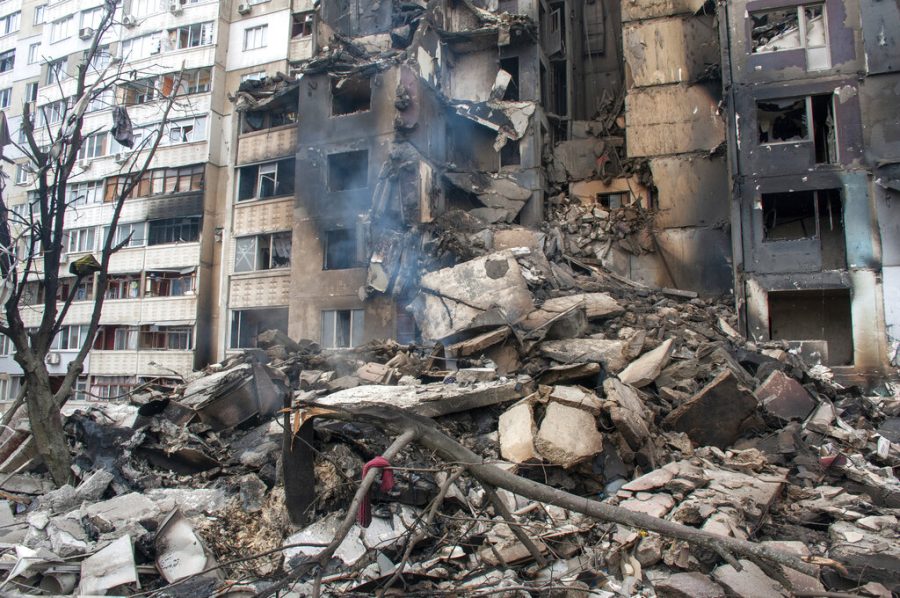The complex relationship of Ukraine and Russia
The past behind the two countries in conflict told by New Trier social studies teachers
The question as to why there is a conflict between Russia and Ukraine has been plaguing the minds of many since Feb. 24, when Russia officially invaded Ukraine territory.
What Vladimir Putin called a “military operation” involved tanks and troops rolling in from Russia, along with multiple air attacks targeting the cities of Kharkiv and Kyiv. The United Nations reported 364 Ukrainian fatalities and 759 casualties as of Feb 24.
Putin has stated many reasons for the attack on Ukraine, one of which being the recent efforts made by Ukraine to join NATO.
“If Ukraine was to join NATO it would serve as a direct threat to the security of Russia,” said Putin in a televised speech on Feb. 21.
U.S History teacher Colby Vargas agrees with the sentiment that NATO is an intimidating force for Russia.
“NATO, in his mind, has always created a Russia that’s an enemy. He feels like he’s been maligned by that group, or misrepresented. If you look at it in strict political terms, Russia is scared of a NATO country popping up next to them.”
The history between NATO and Russia stems from it’s very founding, according to history teacher Carolyn Gerhardt.
“The NATO alliance was created to deter Soviet expansion. Once the Soviet Union collapsed, Putin thinks NATO should have disbanded. Instead, it increased membership to nations that used to be in the Soviet sphere of influence. He sees NATO as stopping Russian growth and prosperity,” she said.
Ukraine has been making strides to enter NATO since 2013. Russia was not concerned 9 years ago because at the time, it was not Volodymyr Zelensky who was the president, but Viktor Yanukovych.
Yanukovych was a staunch supporter of Russia during his time as Ukrainian president. He was in office until 2014 when he was removed after a series of protests demanding his resignation.
“Ever since then, Russia has been mad about that. They’ve been very resentful that Yanukovych was displaced. And that’s the very next year, what did they take? Crimea,” said history teacher Spiro Bolos.
2022 is not the first year to see Russia invade a part of Ukraine. Crimea was a small part of Ukraine until it was violently annexed by Russia in 2014.
“What I feel totally befuddled on is why Russia was allowed to inhabit Crimea in 2014. The world kind of stood back and wrote angry letters,” said Vargas.
Putin has also been making claims stating that the countries have always been unified, and that Ukraine should not be a separate country.
“From the very first steps they began to build their statehood on the denial of everything that unites us,” said Putin in his speech.
According to Bolos, the two countries have a deeply intertwined and complex relationship dating back centuries .
“We have to go all the way back to 987 AD. Putin is saying that Ukraine used to be part of Russia. I mean, that’s actually true. The Russian Empire was founded in Kiev. And it was called Kievan Rus’,” said Bolos.
During the mid 1800s, Russia was divided into three parts. These branches were called Great Russia, White Russia, and Little Russia. In the modern day, many of its territories have become their own independent countries, but the history they share with Russia remains.
What was once referred to as ‘White Russia’ is now known as the countries of Belarus and Lithuania, among other neighboring countries. Modern day Russia was known as ‘Great Russia’.
“The Little Russians are now called Ukrainians,” said Bolos.
Putin has also been pushing another reason for his invasion, claiming it as an attempt to “denazify” Ukraine.
There was a short period of time during World War II in which Ukraine collaborated with Nazi Germany in an attempt to harm Russia. However, this was a brief period of time in Ukraine’s history and not reflective of its current ideologies.
“There were Ukrainians, who hated the Soviets so much that when the Nazis invaded [part of] Ukraine, some allied themselves with the Nazis. And not everybody knew about what was happening with the Holocaust. It’s the expression, ‘the enemy of my enemy is my friend,’’” said Bolos.
The “denazification” argument has been deeply scrutinized by many, including Bolos.
“It’s just a pretext. It’s fake. He’s using it as an excuse to start taking over… My guess would be that he wants to take out Zelensky and put in another Yanukovych.”








































